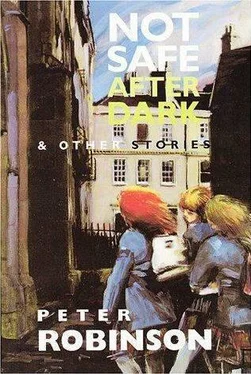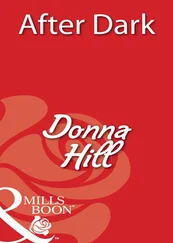‘Same as ever, I suppose,’ said Mrs Banks. ‘We don’t see much of them, do we, Arthur?’
Arthur Banks shook his head.
‘It’s as if they’ve shut themselves away since you were last down.’ Banks’s mother cast him an accusing glance, as if their becoming recluses were his fault. And maybe it was, in a way. The truth is rarely as liberating as people would have us believe; it often binds more than it frees.
‘I’m sorry to hear that,’ he said.
‘You know,’ his mother went on, ‘while you’re here, you ought to go and see Mrs Green. She keeps asking about you, and she was very put out you didn’t drop by and see her in the summer. She still thinks very fondly of you, though I can’t see why, the noise you lot used to make at her house.’
Banks smiled. He remembered Mrs Green fondly, too. She was the mother of an old school friend, Tony Green, whom Banks hadn’t seen since he left home. Tony hadn’t been one of the real in-crowd, but he had been in the rugby team with Banks, and Banks had always liked Mrs Green. Most of the kids did. She didn’t stop them from smoking in her house, and she didn’t mind them playing the sort of music – the Beatles and the Rolling Stones mostly – that most adults hated. Once or twice she had given Banks and Tony half a crown apiece and sent them off to the pictures out of her way. She had also been very pretty, with the kind of bosom young boys dream about, and she certainly had a mouth on her. Mrs Green had a reputation for speaking her mind, nobody ruffled her feathers and got away with it. Tony had gone off to Canada, Banks remembered. And Mr Green had died of emphysema about nine months ago. His mother had told him over the telephone, and he had sent a sympathy card. Yes, he would pay Mrs Green a visit.
So Banks sipped tea with his mother and father, catching up on the local gossip. The usual stuff: another school friend had emigrated to Australia, an old neighbour, who had moved into a home a year ago, had died, and the Venables lad from number sixty-six had been sent to Borstal for mugging a pensioner. Banks didn’t bother telling his mother that it wasn’t called ‘Borstal’ any more but ‘detention centre’ or ‘youth custody centre’. They weren’t much interested in what he’d been doing, outside of the divorce from Sandra. They were more interested in Brian and Tracy, and they expressed regret that neither could come to the party on Sunday: Brian’s band was playing an important series of gigs in Germany, and Tracy had flu. Not entirely convinced this wasn’t some excuse, Banks had dropped by and offered to drive her from her university residence in Leeds, but when he saw her, he took pity and said he’d look in again on his way back. Fortunately, she had friends there who would feed her chicken noodle soup and Lemsip in the meantime.
‘Have you seen who’s moved in next door?’ Mrs Banks asked.
‘No,’ said Banks, ‘but I heard them.’
‘Not that side. The other. A Paki family, that’s who. I must say, though,’ she went on, ‘they seem really nice. Very quiet they are, even the kids, aren’t they, Arthur? And polite. Always say good morning and ask how you’re doing. Talk just like us, they do. Makes a change from that lot on the other side.’
‘Who are they?’ Banks asked.
She shook her head. ‘I don’t even know their name. They moved in about two weeks ago. They’re not very friendly neighbours. Don’t know how many of them live there, either. Shifty-looking lot. Comings and goings all hours of the day and night. Noise. And the place is a pigsty.’
It sounded like a drug house. Banks made a mental note to keep his eyes open. If he noticed anything suspicious, he’d get on to the local police.
Banks’s father picked up the remote control and turned the television on at half-past five, as Banks remembered he did every weekday. ‘Is that the time?’ said Ida Banks. ‘I’d better get the tea on. Pork chops, peas and chips all right?’
‘Fine,’ said Banks, his stomach sinking. As if there was a choice.
‘And a nice bit of steamed pudding and custard for sweet.’
‘I’ll help.’ Banks followed her into the kitchen.
True to his word, Geoff Salisbury came back from Asda with a bag of groceries. He dumped it on the kitchen table and handed Ida Banks two pound coins in change, then they went through to the living room. Banks, peeling potatoes at the time, started to unload the groceries. As he did so, he came across the printed receipt stuck by condensation to the side of a bottle of chilled apple juice.
The print was a little blurred, but even so he could see that the total came to £16.08, which left a discrepancy of £1.92 between that and the £2 Geoff had handed his mother. Holding the receipt, Banks went into the living room.
‘I think you’ve got the change wrong,’ he said, holding out the receipt for Geoff to see.
Banks’s mother frowned. ‘Alan! Must you?’ Then she turned to Geoff. ‘I’m so sorry. Our Alan’s in the police and he can’t seem to let us forget it,’ she said with a dismissive sniff.
‘One of the boys in blue, eh?’
‘CID, actually,’ said Banks.
‘Ah. All that Sherlock Holmes stuff.’
‘Something like that.’
‘Let’s see, then.’ Geoff took a pair of bifocals from his shirt pocket and squinted at the list. ‘Bloody hell, you’re right,’ he admitted, blushing. He showed the receipt to Ida Banks. ‘It’s a fair cop. See there, Mrs B? It looks like an eight to me but it’s really a six. That’s what comes of being too vain to wear my glasses in the supermarket.’
Ida Banks laughed and slapped him on the arm playfully. ‘Oh, get away with you, Geoff. Anyone could make a mistake like that.’
Geoff counted out the rest of the change into her hand. He glanced sideways at Banks, still slightly red with embarrassment. ‘I can see I’ll have to watch myself now there’s a copper around,’ he joked.
‘Yes,’ said Banks, not laughing. ‘I think you better had.’
‘There was no need for that, Alan,’ Banks’s mother said after Geoff Salisbury had left. ‘Embarrassing us all.’
‘I wasn’t embarrassed,’ Banks said. ‘Besides, he tried to cheat you.’
‘Don’t be silly. It’s like he said, he couldn’t see the figures properly.’
‘Does he do this often?’
‘Do what?’
‘Go shopping for you.’
‘Yes. We can’t get around like we used to, you know, what with your dad’s angina and my legs and feet.’
‘Legs and feet?’
‘My varicose veins and bunions. Getting old is no treat, Alan, I can tell you that much. You’ll find out yourself one day. Anyway, he’s been good to us, has Geoff, and now you’ve gone and upset him.’
‘I don’t think he’s upset at all.’
‘Only here five minutes, and there’s trouble already.’
‘Mum, I really don’t think I upset him. Maybe he’ll just be more careful in future.’
‘And maybe we’ll have to find someone else who’ll do our shopping for us and give the place a good dust and a vacuum every now and then. Fat chance of that.’
‘I’m sure he’ll be fine.’
‘Well, I just hope you’ll apologize next time you see him.’
‘Apologize?’
‘Yes. You as good as called the man a thief.’
‘Fine,’ said Banks, raising his hands in surrender. ‘I’ll apologize.’
His mother gave another disapproving little sniff. ‘I’d better see to those pork chops.’ Then she strode off into the kitchen and shut the door behind her.
The Coach and Horses, about a hundred yards away on the main road, was one of those pubs that had hardly changed at all in the past forty years or so. True, they’d got in a jukebox and a few video machines, and the brewery had forked out for a minor facelift sometime in the eighties, hoping to pull in a younger, freer-spending crowd. But it didn’t take. The people who drank at the Coach and Horses had, for the most part, been drinking there most of their lives. And their fathers had supped there before them.
Читать дальше










![Джеймс Чейз - Not Safe to Be Free [= The Case of the Strangled Starlet]](/books/417649/dzhejms-chejz-not-safe-to-be-free-the-case-of-the-thumb.webp)

